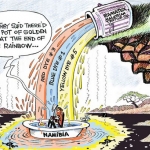Latest Articles
Multinationals accused of human rights abuses can no longer feel safe now that the oil giant is facing allegations of complicity in the execution of Nigerian activist Ken Saro-Wiwa.
Read MoreFor nearly six years Ramatex Textile and Garment Factory barred government regulators from entering industrial premises leased from the City of Windhoek. Ramatex came to Namibia in 2001, lured by the newly implemented African Growth and Opportunity Act (AGOA). Evidence of environmental violations finally emerged after the company absconded.
Read MoreMore than 90% of Royal Bank of Scotland shareholders voted against the bank's pay and pensions policy at its annual general meeting in Edinburgh. RBS does not have to make any changes as a result, saying it was a "substantive" protest at Sir Fred Goodwin's £703,000 a year pension. Sir Philip blamed RBS's difficulties on its acquisition of the Dutch bank ABN Amro in 2007.
Read MoreGoogle's Street View mapping project ran into local opposition in England, with angry residents in the village of Milton Keynes blocking a Google driver when he started taking photographs of their homes. Villagers accused the company of going too far, violating their privacy and possibly facilitating crime.
Read MoreAt the end of
March, the Inter-American Development Bank (IDB) celebrated its 50th
anniversary in Medellin. The occasion presents an opportunity to revise
concepts and move toward a fairer development model. It is logical to
think that among the festivities, a process of evaluation and
self-critique would begin regarding the bank's actions and work in the
Skype's application for the Apple iPhone is igniting network neutrality disputes around the globe after less than a week on the market. Free Press, asked the US Federal Communications Commission to investigate whether AT&T was violating US guidelines by preventing the app from running on its 3G network. An alliance of internet groups on Friday responded to Deutsche Telekom and T-Mobile's threat to block the Skype for iPhone application on its network.
Read MoreEvergrande Real Estate Group, now mired in debt, has become a symbol of China's go-go era of investing, when international bankers, private equity deal makers and hedge fund managers from Merrill Lynch, Deutsche Bank and others rushed here hoping to cash in on the world's biggest building boom.
Read MoreLate last month Blackwater Worldwide lost its billion-dollar contract to protect American diplomats in Iraq, but by next month many of its private security guards will be back on the job here. The same individuals will just be wearing new uniforms, working for Triple Canopy, the firm that won the State Department's new contract.
Read MoreA once-obscure accounting rule was changed Thursday to give banks more discretion in reporting the value of mortgage securities. Apparently under political pressure, the five-member Financial Accounting Standards Board approved a controversial change that makes it possible for banks to keep some declines in asset values off their income statements.
Read MoreThe drop in U.S. demand for high-end jewelry in a slumping economy is having ripple effects around the globe as stores close, workers are laid off in mass in the diamond-polishing factories of Gujarat, and countries like Botswana experience a dramatic drop in diamond revenue.
Read More